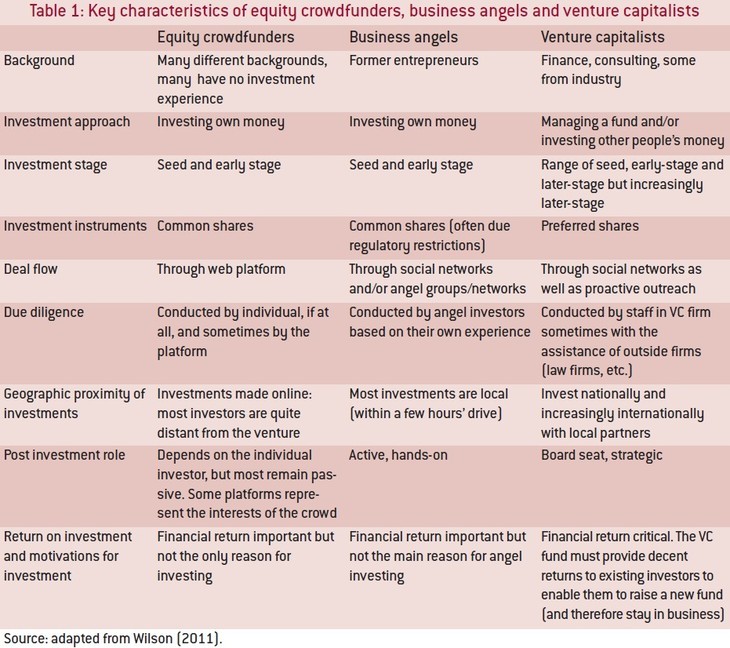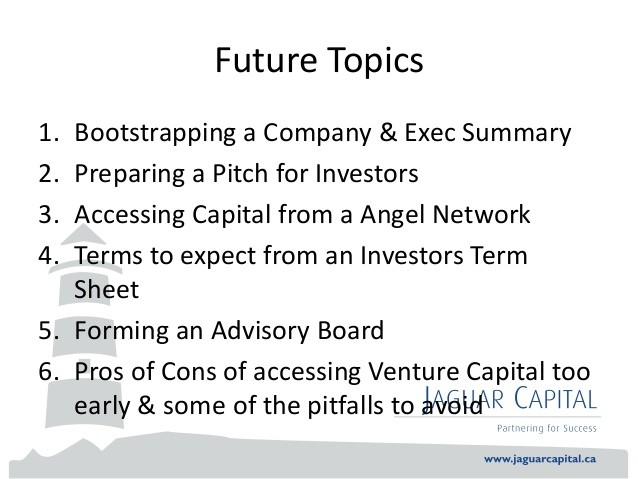The Characteristics Angel Investors Expect
Post on: 16 Март, 2015 No Comment

Angel investment can make a world of difference for a startup. An angel investor, by definition, steps in and provides funding that can get an entrepreneur from the point where personal savings, friends and family can no longer support a company’s growth to when he can land venture capital. Bridging that gap can be the hardest part in the life cycle of a startup. Still, finding an angel investor and convincing him to invest in your business is not always a simple proposition. Even after you pique the interest of an investor, you have to convince him of the value of investing in your entrepreneurial efforts. That means having the characteristics an angel investor is looking for as well as a great business model.
What an Angel Investor Looks For
There are certain characteristics that angel investors look for when deciding whether to make a particular investment. It’s worth remembering that those characteristics aren’t universal. Most angel investors only answer to themselves when making a decision, so they can easily make a gut judgment or rely on a characteristic that seems unrelated to being an entrepreneur. It’s crucial to get to know anyone you’re considering approaching about investing in your business at this level. Learn what their individual considerations are when it comes to deciding on an investment.
It can take an uncommon set of characteristics to interest an angel investor, especially when you consider that many startups looking for this level of funding have few numbers to actually prove their value to angel investors. David Rose, the founder and chairman of New York Angels, notes, There is no one thing that will ‘make’ an angel investment, because all the stars need to align (or at least be close to alignment) for an entrepreneur to be the one out of 40 applicants who gets funded.
Robert Okabe has been an angel investor for over a decade. He points to two categories of characteristics that investors look for: objective and subjective. In both cases, there are negative characteristics that will send an investor running and positive characteristics that will quickly interest them. Okabe says, Objective failures include unrealistic financial models that have unachievable margins or grossly understated expenses, fantastic company valuations, not being able to identify incumbent market leaders and/or competitors, sloppiness (misspelling, numbers that don’t add up). Objective plus signs are basically the opposite signs include items such as realistic assessments of competition, well-thought out cost assumptions, etc. You have to have a realistic view of your market as well as in-depth knowledge of it. Many angel investors also give preference to entrepreneurs who already have startup experience.
Subjective characteristics are typically those that an angel investor might see when interacting with an entrepreneur. The biggest positive is an entrepreneur who enters the discussion with a collaborative mindset and a willingness to admit what he doesn’t know, says Okabe, while noting negative characteristics like arrogance as a counterpoint.
It’s important to consider those characteristics that could knock you or your business out of the running with a particular angel investor. Rose points out, There are quite a few things that by themselves can knock you out of the box as a potential angel investment. Some of them are immediate deal killers. They include: (1) integrity if we get the slightest whiff of anything that’s not quite right, or any experience anyone has ever had with you where you didn’t play straight, or any one single thing, no matter how tiny, where we find you lied to us. you’re out the door; (2) unrealistic valuation if you have a pre-revenue startup company and tell me that you plan to raise $1 million for 10 percent ownership (thus valuing your own piece before my investment at $9 million) I’ll know that we’re too far apart to even have a discussion; (3) unrealistic projections similarly, if you tell me that your revenues will grow from $0 this year to $50 million in your first year of operations, I’ll tell you to go out and get some real world experience first; (4) me-too plans if you’re coming to me with a plan that’s a simple copy of another company already in the space, and can’t immediately help me see why yours is significantly different, I’ll pass.
You may be able to develop the positive characteristics an investor is looking for as well as shed as any negative characteristics that might be a concern. Be wary of tailoring yourself too closely to what one individual investor is looking for, of course, but these characteristics are generally good.
Asking for a Second Chance

It’s entirely possible that you’ll develop the positive characteristics an angel investor is looking for after he’s already passed. It’s not out of the question to ask for a second chance. Okabe says, I generally won’t second guess myself in the short-term (under six months). Entrepreneurs can rarely achieve the type of high impact milestone that can turn me around in that period of time. I do try to be respectful enough of the entrepreneurs so I can have access to a second chance if they prove me wrong over the medium term (nine to 18 months). After about two years both the company and its valuation are generally beyond the point where I can be a meaningful investor.
The characteristics that can make a difference on a second look, according to Rose, is if an entrepreneur can show that he’s met projections, landed a few major customers, or if another investor has put in money and can explain why.
However, Okabe suggests some caution if you find that an investor keeps asking you to meet new requirements before he’ll consider you. Entrepreneurs should beware of investors who string them along with multiple promises to re-assess their investment once milestones are reached (call me once you have a demo, followed by call me when your product is in beta, then let me know when you’ve signed X customers).
Wise Bread is a leading personal finance community dedicated to helping people get the most out of their money. Get daily money tips by following Wise Bread on Facebook or Twitter .














